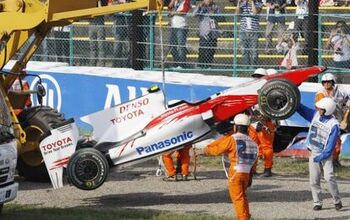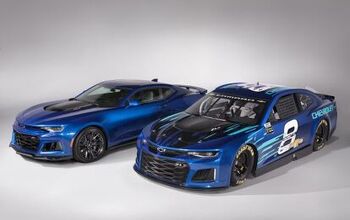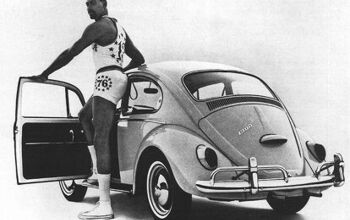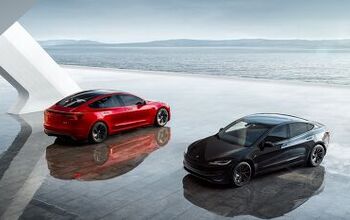QOTD: If You Win on Sunday, Will You Sell on Monday?

Win on Sunday, Sell on Monday. That’s been something of a mantra for car companies over the last hundred-odd years, and success in motorsports is considered a worthy enough goal for major automakers the world over to invest tens of millions – heck, hundreds of millions of dollars – to compete, if not to win. But, is it real? Does “win on Sunday, sell on Monday” hold water?
I think the answer is obvious – because, if winning races actually sold cars, Lancia would be the best-selling car brand on Earth.
WHY ARE WE TALKING ABOUT LANCIA?
In 1974, 1975, 1976, 1983, 1987, 1988, 1989, 1990, 1991, and 1992, different cars carrying the Lancia shield and flag emblem won the World Rally Championship. The company, owned by parent company Fiat, spent millions on rallying – and the cars that brought it ultimate success couldn’t be more different from one another. In the 70s, it was the little FWD Fulvia that won the crown first, giving way to the snarling, mid-engined, Dino-powered Stratos supercar in later years. That car was replaced the RWD 307, which was based on the road-going Montecarlo, a sort of upscale, mid-engine commuter car of the MR2/Fiero variety that (due to copyright issues) was sold in the U.S. wearing the “Scorpion” nameplate. That car, too, was replaced – this time by a four-door hatchback called Delta, which propelled Lancia to its greatest era of rally dominance.
Lancia’s glory was unquestioned. Its sales, on the other hand, were dismal.
Sales were so dismal, in fact, that Lancia pulled out of the U.S. market after the 1982 model year, after just seven years in the market. Across the pond, the situation wasn’t much better. Despite some bright moments here and there, Lancia eventually pulled out of every single international market. Today, you can still buy a Lancia only in Italy – and the car available is a posh little hatch about the size of a Toyota Yaris called the Ypislon, or “Y” … as in, “Y bother?”
THE WRONG KIND OF MOTORSPORT
You might make the argument here that, well – that was rallying. Rallying is cool and all, but it’s a bit fringe, even for racing fans. Heck, if it wasn’t for Sony putting rally cars in Gran Turismo 2, most Americans under 40 might never have even heard of Lancia – and even fewer would know about Monster Tajima and his Pike’s Peak-conquering, twin-engine Suzuki racecars (which, while we’re at it, didn’t do much for Suzuki’s sales, either). Maybe rallying is the problem here, and not “motorsports”. Maybe we should be talking about drag racing.
Depending on who you believe, the term, “win on Sunday, sell on Monday” was actually coined by a Ford dealer named Bob Tasca. Tasca’s dealerships gave him a lot of juice with Ford back in the 1960s, and it was one of Tasca’s dragsters that introduced the Cobra Jet 428 engine to racing. And, to Bob, “win on Sunday, sell on Monday” was more than just a mantra – it was something he actually did.
When he wasn’t busy helping Carroll Shelby shoehorn a 289 c.i. Ford V8 under the hood of an AC Ace to create the very first Cobra, Tasca’s dealerships would modify brand-new Mustangs, then take them to New England drag strips to show them off before putting them right back on the showroom floor, with properly “augmented” price tags and genuine, racetrack-burned rubber Jackson Pollock’ed into the rear wheel wells.
Two generations later, Bob Tasca III is still drag racing Ford Mustangs in the NHRA Funny Car series. He’s been pretty successful, too, with 10 career wins (as I type this) and 28 final round appearances to his famous name – but, unlike his grandfather, the Mustangs Bob III is racing on Sunday are a far cry from the ones his family’s dealerships are selling on Monday.
All the same, it seems like the investment in drag racing is worth it for both Tasca and Ford.
“We are able to measure what our involvement does for selling vehicles,” explained head of global motorsport Mark Rushbrook, in an interview with Australia’s Which Car motor magazine. “As well as the difference between winning, and just being on the track. Winning is important for our customers, and instilling in them a sense of pride about owning a Ford vehicle.”
While I don’t have exact figures, it’s safe to say that Ford currently employs a lot of data scientists – and these people are smrt smart. Their research has led to a novel project in Germany that uses GPS and pedestrian traffic data to switch hybrid Fords between ICE and EV modes in order to minimize human exposure to exhaust fumes and maximize the potential for “green spaces” to scrub out carbon emissions. As such, if they say they can measure racing’s influence, I believe them.
IS IT JUST DRAG RACING, THEN?
Shifting gears, a bit, let’s turn our gaze to NASCAR, where Kyle Larson ( a driver most famous for dropping the ‘n-word’ into a live iRacing event during the pandemic) was rewarded with a multiyear sponsorship deal that will put Hendrick Auto Group’s website on the hood of his racecar until 2023. Larson promptly won some races, which Hendrick says drove enough traffic to HendrickCars.com to equal $1.8 million in leads and over $5 million in television exposure.
“We’re having the best year we’ve ever had,” said Rick Hendrick, whose stores include the largest privately held dealership in the country. “The market is blazing.”
Sure, there’s probably a few cynics out there who will see Hendrick’s sponsorship and its success in terms of web traffic as something having more to do with NASCAR’s core audience supporting racism than a winning driver, but even they can’t deny that Larson makes headlines – and, in addition to “win on Sunday, sell on Monday”, there’s another famous saying that goes, “there’s no such thing as bad publicity.” Maybe there’s some of that at play here, too.
In the end, however, it’s not about whether winning actually sells cars – it’s about who believes that winning sells cars. Edsel Ford II, great-grandson of Henry Ford, is one of those people who believes.
“I’m old school so I guess I still believe that if you win on Sunday, then you do the best you can to sell on Monday,” Ford told APNews. “Winning is so important to us and we do the best job we can in marketing our victories to our customers, to our fans, and we hope that they will come in on a Monday and buy a Ford.”
As a racing fan, I hope they do, too – I need something to do on Sundays while everyone else in the Midwest is watching football.
OTHER FAMOUS SUNDAY WINNERS / MONDAY LOSERS
We picked on Lancia a little bit, here – but they’re not the only car company to win on Sunday only to shit themselves on the showroom floor on Monday. The history of motorsports is littered with the remains of brash, upstart carmakers who turned to racing in order to “prove themselves” against the established names in the industry. Some, like Warren Mosler’s Consulier GTP, eventually came to be appreciated in later years, despite fewer than a handful of those dominant race-winners ever finding buyers. Others, like the Chrysler-based Talbot Sunbeam Lotus, would still be laughed out of even the most forgiving of Facebook’s dedicated shitbox love-ins, despite wresting the World Rally Championship from the mighty fingers of Lancia and Audi in 1981. More recently, Marussia and Spyker both launched brands, built cars, spent their way into Formula 1, then petered out with barely a whisper of appreciation for – at least, in the case of the Spyker – their distinct takes on the supercar.
What do you think, dearest B&B – is there something to this whole motorsport = sales equation, or is this more a battle of fragile egos at the pinnacle of business trying to one-up each other in the press? And, if so, is that really even such a bad thing? Scroll on down to the comments and let us know.
[Image: AppleZoomZoom/Shutterstock.com]

I've been in and around the auto industry since 1997, and have written for a number of well-known outlets like Cleantechnica, the Truth About Cars, Popular Mechanics, and more. You can also find me talking EVs with Matt Teske and Chris DeMorro on the Electrify Expo Podcast, writing about Swedish cars on my Volvo fan site, or chasing my kids around Oak Park.
More by Jo Borras
Latest Car Reviews
Read moreLatest Product Reviews
Read moreRecent Comments
- Probert They already have hybrids, but these won't ever be them as they are built on the modular E-GMP skateboard.
- Justin You guys still looking for that sportbak? I just saw one on the Facebook marketplace in Arizona
- 28-Cars-Later I cannot remember what happens now, but there are whiteblocks in this period which develop a "tick" like sound which indicates they are toast (maybe head gasket?). Ten or so years ago I looked at an '03 or '04 S60 (I forget why) and I brought my Volvo indy along to tell me if it was worth my time - it ticked and that's when I learned this. This XC90 is probably worth about $300 as it sits, not kidding, and it will cost you conservatively $2500 for an engine swap (all the ones I see on car-part.com have north of 130K miles starting at $1,100 and that's not including freight to a shop, shop labor, other internals to do such as timing belt while engine out etc).
- 28-Cars-Later Ford reported it lost $132,000 for each of its 10,000 electric vehicles sold in the first quarter of 2024, according to CNN. The sales were down 20 percent from the first quarter of 2023 and would “drag down earnings for the company overall.”The losses include “hundreds of millions being spent on research and development of the next generation of EVs for Ford. Those investments are years away from paying off.” [if they ever are recouped] Ford is the only major carmaker breaking out EV numbers by themselves. But other marques likely suffer similar losses. https://www.zerohedge.com/political/fords-120000-loss-vehicle-shows-california-ev-goals-are-impossible Given these facts, how did Tesla ever produce anything in volume let alone profit?
- AZFelix Let's forego all of this dilly-dallying with autonomous cars and cut right to the chase and the only real solution.


































Comments
Join the conversation
IMSA & LeMans racing in the early 2000s to 2010s made me reconsider the Corvette brand. Changed my mind about their design qualification. Today a C6 sits in my driveway. It would not be there if not for that racing program.
Rick Hendrick Chevrolet/Buick/GMC customer here (Short Pump, VA dealership - a western suburb of Richmond), and while I'm a die-hard Formula 1, Formula E, MotoGP, and MotoAmerica Superbike fan, my wife has taught me to appreciate and enjoy NASCAR (well, at least until Junior retired), and I'll watch a fair bit of other types of sports car racing, my loyalty to the dealership has very little to do with their racing exploits. It has everything to do with they're being the only Chevrolet dealer in the Richmond area that not only takes their EV vehicles seriously, services them well, and actually acts like they're happy to have them on the lot and sell them. The dealership has a rather good reputation with the local EV community, has trained salespeople who understand what it is they're selling, and are setting themselves up to be in a good position as GM invariably slides towards total EV-ness.